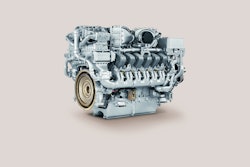Cummins Filtration Inc., has debuted its all-new NanoNet line of fuel filtration products that utilize nanotechnology in the filtration media, providing an exceptional level of efficiency and harmful particulate removal. NanoNet marks the first time that a nanotechnology-based filtration media has been commercially developed for fuel filtration products within the industry.
The nanotechnology-based NanoNet filtration media is available on the following Cummins Filtration Fleetguard products: FF5810; FF5811; FF5812; FF5813; FF5814; FF5815; FF5816; FF6817; FF5819; FF5823; FF53093; FS53001 and FS53002.
Debuting exclusively with Fleetguard fuel filtration products, the company’s technologically-advanced NanoNet filtration media will eventually make its way into other Cummins Filtration product segments beginning in early 2013.
Cummins Filtration’s NanoNet nanotechnology-based fuel filtration media has been developed over several years of careful and extensive real-world field-testing to ensure an unrivaled degree of harmful particulate removal from fuel systems. What’s more, NanoNet fuel filtration products exhibit between 7 to 13 times greater retention of harmful particles within the fuel filtration media during engine vibration and fuel surge than its closest competitor. Fuel surge results in a fluctuation of fuel flow within the system whenever the engine’s output is increased or decreased (engine revs/throttle input are increased or decreased).
Of vital importance is the rigorous testing that Cummins Filtration undertook in its development of the remarkable NanoNet fuel filtration media technology – in real-life application where an engine and filter are subject to harm from exposure to dirt, dust infiltration and extreme vibration rather than relying solely upon fuel filter testing in more controlled static laboratory settings. Joseph Saoud, President – Cummins Filtration remarks, “In today’s 24/7 operations, where it counts in filtration is in providing customers the best technology for maximum filtration efficiency with minimal flow restriction. In turn this creates greater up-time by extending service intervals and optimizing filter life. This latest in Fleetguard’s proprietary advanced filter media family is developed to deliver unmatched protection and superior up-time for customers while lowering Total Cost of Ownership (TCO).”
Because of the advanced technology and tighter component tolerances found in today’s sophisticated diesel engines – and the high degree of fuel contamination and/or fuel variation that can occur along the supply chain from the fuel refinery, transport/distribution system, fuel storage facilities, right up until it reaches a vehicle’s fuel injection system – satisfactory fuel filtration has become more important than ever to ensure proper engine performance, efficiency and equipment uptime. Of note, the World Wide Fuel Charter (WWFC) has determined that a full 50% of the fuel dispensed at retail fuel pumps around the globe does not meet the necessary cleanliness of ISO standards recommended by ISO 18/16/13 (ISO 4406 Contamination Code).
Cummins Filtration’s patented NanoNet fuel filtration media traps 98.7% of all particles as small as 4 microns (12 times smaller than the smallest particle visible to the human eye) to deliver superior protection and performance from expensive High Pressure Common Rail (HPCR) fuel injection systems running at pressures at or exceeding 30,000 psi (2,000 bar).

















